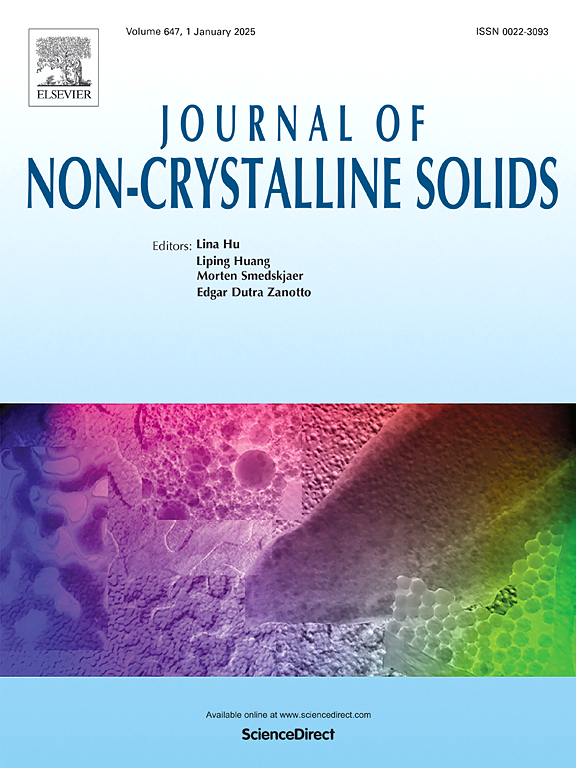关于再生挡风玻璃可调结构、光学和机械特性的综合研究
IF 3.5
3区 材料科学
Q1 MATERIALS SCIENCE, CERAMICS
引用次数: 0
摘要
对汽车前挡风玻璃废料进行回收,以研究其在汽车中再利用的可行性。使用 1 mol% 的 B2O3、NaCl、KCl 和 P2O5 作为添加剂,在 1550∘C下重熔废玻璃。分别使用傅立叶变换红外光谱、拉曼光谱、紫外可见光谱和维氏硬度计对重熔玻璃进行表征和测试。添加剂通过改变硅酸盐结构单元来改变玻璃。与未添加上述添加剂的回收玻璃(RB7)相比,这些改性导致密度增加,摩尔体积减少。所有回收玻璃的光带隙都在 3.43-3.54 eV 的绝缘范围内,硬度范围为 4.29-5.74 GPa。含有 P2O5 的再生玻璃显示出与原始挡风玻璃相似的特性。这种方法为汽车挡风玻璃的再利用找到了一条减少碳足迹的途径。本文章由计算机程序翻译,如有差异,请以英文原文为准。
A comprehensive study on tunable structural, optical and mechanical properties of recycled windscreen glasses
Waste front windscreen glasses of cars are recycled to study their feasibility for reuse in automobiles. The waste glasses are remelted at 1550 C using 1 mol% of BO, NaCl, KCl, and PO as additives. The remelted glasses are characterised and tested using the Fourier transform infrared, Raman spectroscopy, UV-visible spectroscopy, and Vicker’s microhardness tester, respectively. The addition of additives modified the glasses by changing the silicate structural units. These modifications lead to an increase in density and a decrease in molar volume compared to the glass without the above additives, recycled glass (RB7). The optical band gap of all the recycled glass falls within the insulating range of 3.43-3.54 eV, with a hardness range of 4.29-5.74 GPa. The PO contained recycled glasses that exhibited similar properties to those observed for pristine windscreen glasses. This approach finds a way to reuse windscreen glasses for automobiles with a decreased carbon footprint.
求助全文
通过发布文献求助,成功后即可免费获取论文全文。
去求助
来源期刊

Journal of Non-crystalline Solids
工程技术-材料科学:硅酸盐
CiteScore
6.50
自引率
11.40%
发文量
576
审稿时长
35 days
期刊介绍:
The Journal of Non-Crystalline Solids publishes review articles, research papers, and Letters to the Editor on amorphous and glassy materials, including inorganic, organic, polymeric, hybrid and metallic systems. Papers on partially glassy materials, such as glass-ceramics and glass-matrix composites, and papers involving the liquid state are also included in so far as the properties of the liquid are relevant for the formation of the solid.
In all cases the papers must demonstrate both novelty and importance to the field, by way of significant advances in understanding or application of non-crystalline solids; in the case of Letters, a compelling case must also be made for expedited handling.
 求助内容:
求助内容: 应助结果提醒方式:
应助结果提醒方式:


